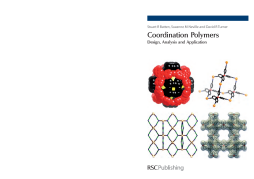
Additional Information
Book Details
Abstract
The field of coordination polymer research has undergone rapid expansion in recent years. No longer are these materials the vaguely defined 'insoluble material' at the bottom of your vessel that spell death for your reaction. They have gone from 'polymeric rubbish' to 'materials of the future'. Great leaps in the deliberate design of coordination polymers were made in the 1990s. These were allied with similar advances in related areas such as organic crystal engineering, metallosupramolecular chemistry and X-ray diffraction. No longer did we assemble things atom by atom. Whole molecules were used as building blocks and new materials were made. This is the first book to provide a broad overview of all the major facets of coordination polymer research in one place. It combines chapters on nets and interpenetration with wide-ranging surveys of transition metal and lanthanoid coordination polymers and their properties. The aim is to provide a flavour of each aspect whilst introducing the important concepts and developments using carefully selected examples. After an introduction, the text is split into three sections: -Design (nets, interpenetration, malleability) -Analysis (transition metal coordination polymers, lanthanoid coordination polymers, organometallic networks, organic-inorganic hybrids) -Application (magnetic properties, porosity, acentric and chiral networks, reactive coordination polymers, other properties). Written in the style of a tutorial review, the book is suitable for both senior specialists and new postgraduate students taking their first steps in the field. It also provides an authoritative and detailed reference source.
Stuart R. Batten completed a BSc(Hons) and PhD at the University of Melbourne before taking up postdoctoral positions at the Universities of Bristol and Melbourne, and Monash University. He held two consecutive ARC fellowships at Monash, where he accepted a Lectureship and was subsequently promoted to Senior Lecturer in 2007. He has 150 publications to his name (mainly in the area of coordination polymers) and has been awarded numerous prizes for his work, including the Rennie, Edgeworth David and HG Andrewartha medals, and the Le FÞvre prize. Suzanne M. Neville completed a BSc(Hons) and PhD (on porous functional coordination polymers) at the University of Sydney. She currently holds a postdoctoral position at Monash University and has been awarded a Marie Curie Fellowship for 2008 to continue research into spin crossover materials at the ICMCB, Bordeaux. She has numerous publications to her name in the areas of coordination polymers and functional magnetic materials. David R. Turner completed a M.Sci. in Chemistry at King's College, London and a Ph.D. at King's College and Durham University. He currently holds an ARC post-doctoral fellowship at Monash University. Dr Turner is the author of 30 publications in the areas of supramolecular chemistry and crystal engineering and is a co-author of an undergraduate textbook on supramolecular chemistry and nanochemistry.
